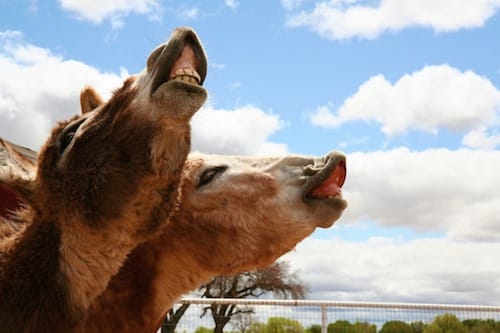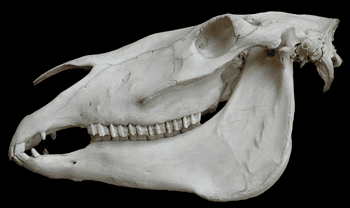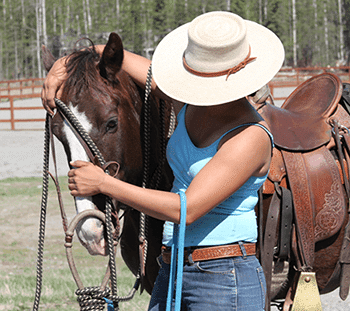“Wolf Teeth” and Other Curious Facts About Horse Teeth

Then, with a whoosh, she lifts her head up, curls her upper lip and shows off her pearly white teeth! It’s the flehman response…
The flehman response is actually your horse’s way of reacting to strange new smells. She’s doing this to help transfer the smell to the vomeronasal organ for closer inspection.
You’ve probably seen your horse curl her lip up like this when presented with a strange new smell. For many horse owners, this is the best glimpse you’ll ever get of your horse’s teeth. Still, a basic understanding of how horse teeth work is important for any owner to have.
So, here are some curious and fun facts about horse teeth!
1. Horses have three main types of teeth.
Incisors in the front are there to help your horse bite food or rip out grass. The cheek teeth in the back include both premolars and molars. They help grind the food and move it to the back of the mouth for swallowing. The third type of teeth are…
2. Canines! Male horses have teeth for fighting.
These teeth erupt around age 4-5 and are mostly found in male horses. Some mares have them too.
3. Cheek teeth keep growing throughout their life.
Horses have 12 premolars and 12 molars they use for chewing grasses. They have baby teeth that are shed before adulthood. Then, their remaining teeth constantly erupt over the course of their life to make up for the wearing down of the grinding surface of the tooth. Each year, your horse’s teeth will grow about 1/8 inch.
4. Horses have “wolf teeth.”
These are small teeth in front of the main upper cheek teeth. They come in around age 6-18 months and can vary in size. Some of them are downright tiny and not all horses have them. They are left over from horses’ evolution and no longer serve any purpose.
5. Horses need to have their teeth filed down periodically.
Modern horses don’t spend as much time grazing as their wild ancestors, so they need regular dental care as a result. The chewing surfaces are not level – they actually meet at a 10-15 degree slope. As a result, sharp points can develop on the outer edges of the upper cheek teeth and the inner edges of the lower cheek teeth. These can rub uncomfortably and cause ulcers. Horse dentists use a rasp to file these sharp edges down.
6. Horses need their first dentist checkup at a young age.
Foals should have their teeth checked for any developmental problems. Then, the first full dental examination should happen around age 18 months to two years of age. Once mature, horses need yearly dental checkups.
7. Teeth can give clues about your horse’s age.
A skilled horse dentist or vet can make a reasonable guess at your horse’s age up until about age 10. After that, a horse’s age can be guessed within a window of about five years.
8. A poorly behaving horse may have tooth issues.
Sometimes your horse is having mouth pain and misbehaves as a result. Watch out for tossing heads, resistance to the bit, and a grumpy attitude in a horse who is having dental pain.
9. Colorful mouths are normal!
Your horse’s mouth isn’t always going to be one common color. Instead, it’s normal for the tongue to be stained brown or black from plant pigments and dirt. The mouth and lips are usually pink but can have some black coloring in them too. Tissues around your horse’s teeth should be pink. Teeth should be cream-colored with darker streaks from plant pigments.
10. Watch out for these common tooth problems in horses.
Horses can experience developmental abnormalities where the teeth don’t grow in correctly. Fractured teeth sometimes occur in horses with teeth weakened by disease. Cheek tooth infections will first be detected if there is swelling on the face or jaw. Then, diastema (or food trapped between teeth) can cause infection and gum disease.
11. Mastication is a fancy word for…
… Chewing! Food is first grasped by the incisor teeth in the front. Then, the food is moved back to the cheek teeth by the motion of the tongue and the cheek muscles. The large cheek teeth grind against each other until the food is chewed enough that it can be swallowed.
12. Horses’ mouths are perfect for bits!
There’s a natural gap between the front incisors and the back cheek teeth. It’s a perfect place to have a metal bit for riding. The bit should never rub against the teeth. Instead, it should only come in contact with the bars, corners of the mouth and the horse’s tongue.
13. Mini-horses have not-so-mini teeth.
Yup! You read that correctly. Miniature horses have shrunken down in size due to selective breeding. But, their teeth have stayed roughly the same size – just with less space to fit into the mouth. As a result, many mini horses require molar and premolar extraction because of overcrowding in the mouth.
14. Watch out for these health problems related to teeth.
Not sure if your horse is having dental pain? Along with the misbehaviors listed above, also watch out for these signs that your horse needs a dental checkup: choking/colicking, poor body weight, poorly chewed food showing up in manure, bad breath, excessive salivation, and a head tilt while chewing are all signs of dental pain.
15. Take away message…
If you have a basic understanding of your horse’s teeth, you can do a better job caring for him year to year. So, pay attention! Watch for signs of dental pain and be sure to have your horse’s teeth checked once per year by a vet or horse dentist. You’ll end up with a happy and healthy horse!
Sources:
https://vcahospitals.com/know-your-pet/equine-dentistry
https://thehorse.com/118825/20-things-your-horses-teeth-are-telling-you/



